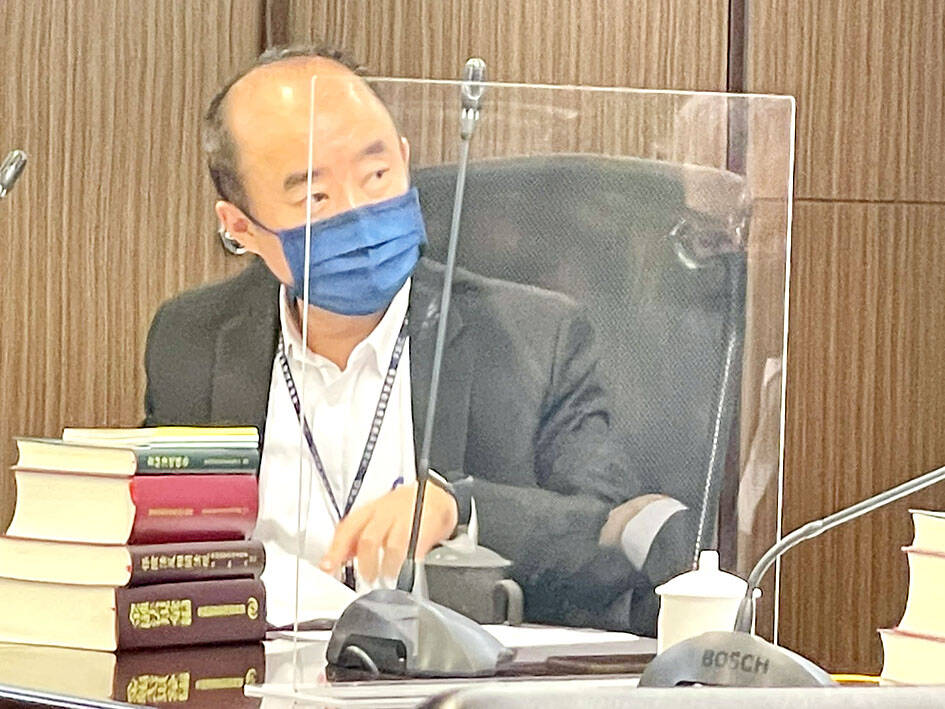Local life insurers would be allowed to reclassify their financial assets under the International Financial Reporting Standards 9 (IFRS 9) to reflect the effects of rate hikes on their liabilities, the Financial Supervisory Commission (FSC) said yesterday.
The move is also expected to help insurers mitigate the effects on their financial gauges of aggressive rate hikes by the US Federal Reserve, especially the equity-to-asset ratio, the commission said.
The commission made the announcement after the Accounting Research and Development Foundation on Thursday approved a proposal to reclassify assets.

Photo: Kelson Wang, Taipei Times
“The FSC respects the accounting foundation’s decision and we will let insurance companies to decide themselves whether to reclassify financial assets,” Insurance Bureau Deputy Director-General Thomas Chang (張玉煇) told an online news conference. “The management and the accountants should explain explicitly the necessity of reclassification, and make announcement in advance.”
The commission would also require insurers to set up special reserves if they plan asset reclassifications to maintain a solid financial profile, Chang said.
Insurers can reclassify their financial assets from this month, the commission said.
Seven life insurers reported that their equity-to-asset gauges dropped below the 3 percent minimum as investment values plummeted amid rate hikes.
Insurers including Cathay Life Insurance Co (國泰人壽) last week said rate hikes affected their assets and liabilities, but the accounting rules only enabled them to reflect the impact on assets.
The commission yesterday also said that the tighter IFRS 17 would take effect in Taiwan in 2026, allowing time for local insurers to adjust their accounting, actuarial, investment and risk control systems.

MULTIFACETED: A task force has analyzed possible scenarios and created responses to assist domestic industries in dealing with US tariffs, the economics minister said The Executive Yuan is tomorrow to announce countermeasures to US President Donald Trump’s planned reciprocal tariffs, although the details of the plan would not be made public until Monday next week, Minister of Economic Affairs J.W. Kuo (郭智輝) said yesterday. The Cabinet established an economic and trade task force in November last year to deal with US trade and tariff related issues, Kuo told reporters outside the legislature in Taipei. The task force has been analyzing and evaluating all kinds of scenarios to identify suitable responses and determine how best to assist domestic industries in managing the effects of Trump’s tariffs, he

TIGHT-LIPPED: UMC said it had no merger plans at the moment, after Nikkei Asia reported that the firm and GlobalFoundries were considering restarting merger talks United Microelectronics Corp (UMC, 聯電), the world’s No. 4 contract chipmaker, yesterday launched a new US$5 billion 12-inch chip factory in Singapore as part of its latest effort to diversify its manufacturing footprint amid growing geopolitical risks. The new factory, adjacent to UMC’s existing Singapore fab in the Pasir Res Wafer Fab Park, is scheduled to enter volume production next year, utilizing mature 22-nanometer and 28-nanometer process technologies, UMC said in a statement. The company plans to invest US$5 billion during the first phase of the new fab, which would have an installed capacity of 30,000 12-inch wafers per month, it said. The

Taiwan’s official purchasing managers’ index (PMI) last month rose 0.2 percentage points to 54.2, in a second consecutive month of expansion, thanks to front-loading demand intended to avoid potential US tariff hikes, the Chung-Hua Institution for Economic Research (CIER, 中華經濟研究院) said yesterday. While short-term demand appeared robust, uncertainties rose due to US President Donald Trump’s unpredictable trade policy, CIER president Lien Hsien-ming (連賢明) told a news conference in Taipei. Taiwan’s economy this year would be characterized by high-level fluctuations and the volatility would be wilder than most expect, Lien said Demand for electronics, particularly semiconductors, continues to benefit from US technology giants’ effort

‘SWASTICAR’: Tesla CEO Elon Musk’s close association with Donald Trump has prompted opponents to brand him a ‘Nazi’ and resulted in a dramatic drop in sales Demonstrators descended on Tesla Inc dealerships across the US, and in Europe and Canada on Saturday to protest company chief Elon Musk, who has amassed extraordinary power as a top adviser to US President Donald Trump. Waving signs with messages such as “Musk is stealing our money” and “Reclaim our country,” the protests largely took place peacefully following fiery episodes of vandalism on Tesla vehicles, dealerships and other facilities in recent weeks that US officials have denounced as terrorism. Hundreds rallied on Saturday outside the Tesla dealership in Manhattan. Some blasted Musk, the world’s richest man, while others demanded the shuttering of his